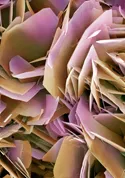Somebody Stop This Pain!
Anyone who has had the misfortune to have kidney stones knows that they’re nothing short of agony. Their likening to razor blades is fairly accurate, as the majority of them aren’t smooth, but rather jagged in nature. However, when walking into your doctor’s office to remedy this excruciating ailment, the solutions offered would often seem laughable if they were not woefully inadequate.
“Excuse me, Doctor, but how many Percocet should I take?”
Calcium + Oxalate = Kidney Stones

Kidney stones are most commonly caused by hypercalciuria and/or hyperoxaluria. Due to either dietary excess of foods containing these components, or your body’s inability to break them down sufficiently, the presence of too much calcium or oxalate results in crystals being formed inside the kidneys.
When seeking advice from the average general practitioner, the most common recommendation is to drink more water, since being well hydrated dilutes the high concentrations of just about anything in the kidneys. Secondary is advice to cut down on foods that may exacerbate the problem, such as dairy (high in calcium) and berries (high in oxalates). There are lists of foods high in calcium and oxalate available on many websites, but does abstaining from these while loading up on water really get to the root of the problem? Recent studies have answered an overwhelming “No,” especially when results showed that higher dietary calcium intake actually resulted in a protective effect against stone formation.
So the question still remains – what’s the best way to prevent kidney stones?
Breaking Down the Calcium
A common denominator in many recurrent kidney stone sufferers is low serum and erythrocyte magnesium levels. But more important even than magnesium deficiency per se is an inadequate magnesium to calcium ratio. This is very pertinent to those who may be supplementing heavily with calcium.


Breaking Down the Oxalate
Conclusive studies have shown that there is a higher rate of kidney stones formed in those with low rates of colonization of Oxalobacter 

In other words, insufficient amounts of the O. formigenes strain may lead to a higher amount of oxalates absorbed into the intestinal walls, leading to higher urinary oxalate concentration.
It has been hypothesized that by supplementing with this bacteria and repopulating the intestines, calcium oxalate stone formation could potentially be reduced or abolished entirely. This isn’t very difficult to believe given the human body’s sensitive biological balance, and the repercussions from common medical solutions like antibiotics. Probiotics have long been solutions to seemingly hopeless ailments like ulcers caused by H. pylori, Irritable Bowel Syndrome, Colitis, yeast overgrowth, and a host of disorders of the gastrointestinal tract.
The beneficial flora in the human body perform enough metabolic processes to be considered an organ in and of themselves. Protecting the health of this vital system in the body goes a long way toward protection from painful kidney stones.
So, what now?
By discussing these natural alternatives with your physician you may find your way to more lasting and less painful results.
– Try locating a good source of Oxalobacter formigenes, rather than just the enzyme, to help repopulate your intestines.
– Investigate the possibility of low magnesium.
– And do some research on what type of magnesium is the best for you.
And don’t forget – keep drinking plenty of water!
Note: Neither of these possible solutions for keeping calcium oxalate stones at bay takes into account genetic or auto-immune disorders that may result in stone formation, such as renal tubular acidosis (which is the kidney’s inability to properly acidify the urine). Consult with your physician before considering any and all supplements.
